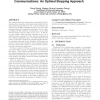Free Online Productivity Tools
i2Speak
i2Symbol
i2OCR
iTex2Img
iWeb2Print
iWeb2Shot
i2Type
iPdf2Split
iPdf2Merge
i2Bopomofo
i2Arabic
i2Style
i2Image
i2PDF
iLatex2Rtf
Sci2ools
120
click to vote
MOBIHOC
2007
ACM
2007
ACM
Distributed opportunistic scheduling for ad-hoc communications: an optimal stopping approach
We consider distributed opportunistic scheduling (DOS) in wireless ad-hoc networks, where many links contend for the same channel using random access. In such networks, distributed opportunistic scheduling involves a process of joint channel probing and distributed scheduling. Due to channel fading, the link condition corresponding to a successful channel probing could be either good or poor. In the latter case, further channel probing, although at the cost of additional delay, may lead to better channel conditions and hence higher transmission rates. The desired tradeoff boils down to judiciously choosing the optimal stopping strategy for channel probing and the rate threshold. In this paper, we pursue a rigorous characterization of the optimal strategies from two perspectives, namely, a network-centric perspective and a user-centric perspective. We first consider DOS from a network-centric point of view, where links cooperate to maximize the overall network throughput. Using optimal...
Related Content
| Added | 24 Dec 2009 |
| Updated | 24 Dec 2009 |
| Type | Conference |
| Year | 2007 |
| Where | MOBIHOC |
| Authors | Dong Zheng, Weiyan Ge, Junshan Zhang |
Comments (0)

